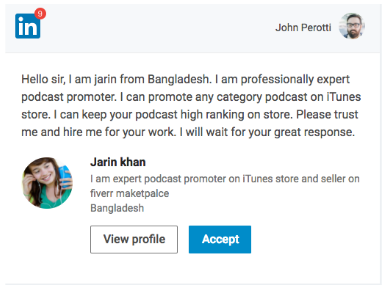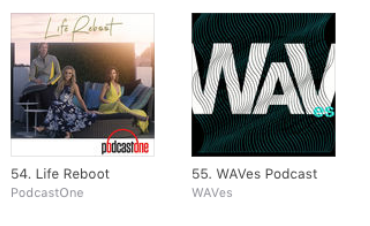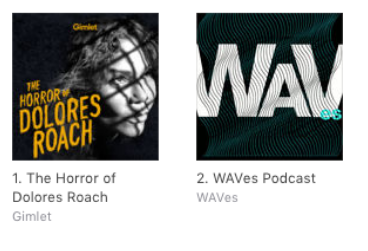
Editor’s note: Hot Pod is a weekly newsletter on the podcasting industry written by Nick Quah; we happily share it with Nieman Lab readers each Tuesday.
Welcome to Hot Pod, a newsletter about podcasts. This is issue 182, published October 23, 2018.
Those wacky charts, week three. Buckle your seatbelts: We’re stretching this story out to another week. As the discourse around click farms and Apple chart manipulation continued to swell last week, a producer named John Perotti was contacted over LinkedIn by someone claiming to be a “podcast promoter” on Fiverr, the online freelance services marketplace. Perotti, who manages podcast production at WBUR for his day job, decided to run an experiment: He would follow up with the scammy offering, apply it to his now-defunct personal podcast feed, and tweet out his journey down the rabbit hole. (Shouts to Perotti for still actively checking his LinkedIn profile.)
John kindly agreed to write up the experiment for us, but before we get to his adventure, a quick preamble.
After writing about the Apple Podcast charts two weeks ago, during which I briefly mentioned the Fiverr scam, I heard from some readers who argued:I’ve heard the latter argument before, and though I am somewhat sympathetic — it’s partly why I haven’t written extensively about chart dysfunction until now — my sense is that we’ve hit a tipping point with the charts in recent months where the problem is now past the point of being just an innocuous quirk. To return to a question I raised in that column: What does it mean when the top of the Apple podcast charts, one of the first touchpoints for many newcomers, features more scams than authentic entries?
I still think the former point is unnecessarily dismissive (perhaps nihilistic?). Newer listeners still use the charts for discovery, and there are still rewards for high placements generally provided by those unfamiliar with the idiosyncrasies of podcast-land and the charts: providers of broader media coverage, new listeners still trying out podcasts, along with potential buyers of derivative works like talent agencies, book publishing houses, and so on. The Apple Podcast Charts are supposed to be a signal for sorting and discovery. What we’re seeing now feels like a signal failure.
With these things in mind, let’s get to Perotti.
How I cheated the charts for $5 [by John Perotti]. Earlier this month, I noticed something strange on the iTunes podcast charts: A bunch of shows I’d never seen before were in the top spots, even pushing The Joe Rogan Experience out of the top 20. Others noticed, too. A day or so later, everything went back to roughly the way it was before, leaving many of us wondering what the heck was going on.
Then “Jarin khan” came into my life, via an unsolicited LinkedIn message.


After screwing around with “Jarin” a bit, I started thinking: Okay, let’s see what they can do. Obviously, I was not to going to endanger my job and use anything I produce professionally at WBUR. But I had just the podcast for the job: WAVes, a one-off, six-episode podcast from 2017 that showcased work by my friends and me. It featured ambient music, weird storytelling, profiles of bands I liked…and an episode that’s 10 minutes of drone music. It had about 300 downloads and no reviews. Definitely not bound for the top spot without some help.
“Jarin” informed me that their Fiverr account had been disabled and sent me to another similar service. That seemed like a red flag, but I trusted that PayPal and my neurotic attention to checking my credit report would give me enough protection. So I shelled out five dollars and “Jarin” — whose account now featured a profile pic of a different person — confirmed that my rocket ride to the top would go down on October 19, the very next day.
That morning, WAVes was actually on the iTunes Arts chart — almost at the bottom, but there nonetheless. As the day progressed, it kept climbing, and then appeared on the All Categories chart.
It topped out in the early afternoon: No. 2 on the Arts chart and No. 55 on the All Categories chart. I received a message letting me know the deed was done and that I could pay monthly to keep it positioned high.


What have I really gained from this?
It should be obvious to anyone who takes a closer look that my podcast, WAVes, is over a year old and has exactly zero reviews. So the fact that it’s charting is very fishy. As of Sunday, two days after all of this activity, the podcast racked up 170 more downloads than it had previously. Much of that activity, not surprisingly, was from Bangladesh.
This doesn’t seem like a good strategy for podcasting success. But what about podcasts that already have a lot of subscribers and reviews and just want to get an extra boost in the charts? Could they ever be caught doing this? Several people jumped into my Twitter DM’s to tell me that these charts might only be important to bigger publishers. In my personal experience, though, I find a lot of new podcasts to check out there, and the charts definitely make shows more visible; more than half of people listening to podcasts are thought to use Apple Podcasts as their primary listening app, and many popular apps rely on Apple’s podcast directory.
Why do the charts work the way they do? Apple’s explanation for why it doesn’t simply track downloads and subscribers is actually a pretty good one: The Joe Rogan Experience would be pinned at the top, followed by powerhouses like Serial and This American Life. There would be very little movement otherwise. The company hopes that the charts can be, in part, a discovery tool, and that’s why the algorithm takes into account podcasts that are on the move.
I don’t know if podcasters use click farms regularly. Apple has said it’s working on cracking down on this. But my experience shows that this cheating thing sort of works — though I’m still waiting for the call that my podcast has been optioned for a TV series.
Number of the week: $150 million. That’s how much Scripps, the Cincinnati-based media concern and parent company of Stitcher, is paying to buy the digital audio technology and measurement company Triton. The move was announced last week, and once it is complete, Scripps will gain a digital-audio–focused SaaS company whose clients include NPR, Pandora, Spotify, and iHeart.
One thing to note: Triton partners with Edison Research to produce the benchmark Infinite Dial study that, aside from giving the podcast space credible sizing numbers, also happens to be a solid marketing vehicle for the industry. I checked in with Edison, and the acquisition will not impact the study moving forward. “We’ve communicated with Triton about all of this,” Edison senior vice president Tom Webster told me. “We intend the Infinite Dial to go on for many years, like Celine Dion’s heart.”
Midterms snapshots. We’re exactly two Hot Pod issues out from the midterm elections here in these United States, and I was curious about how different news and/or political podcast teams are thinking through coverage. Here’s a sample of what I’ve learned:
Crooked Media: The progressive media company has been experimenting with podcast advertising technology to help out with voter registration drives. If you downloaded Pod Save America lately, you might have heard a voter registration call to action that’s specific to your state. The production crew made different reads for listeners in different states, and used Art19’s dynamic ad insertion tool to geo-target.
Producer Mukta Mohan tells me that the workload to execute this campaign wasn’t that heavy. “Our team already put together all of the info for each state — last day to register, if you can register in person on Election Day, etc.,” said Mohan. “So we wrote copy for Lovett and Tommy to read when they did regular ad reads, then we just edited them down and used Art19’s tool to insert. It was really smooth.”
The company has also built a separate micro-site to focus on voter registration called Vote Save America, and developed a special episode on restoring voting rights to American citizens with felony records featuring voices from inmates at San Quentin State Prison.
The New York Times: The Times’ audio team isn’t producing a special standalone series for the elections again — hat tip to The Run Up — opting instead to funnel its midterm coverage purely through The Daily. “We do have a coverage plan,” producer Annie Brown told me. “It’s just that it may not be recognizable to listeners.” You can already see the strategy playing out with the podcast’s recent mini-documentaries like the two-part “The Battle for Missouri,” featuring national correspondent Sabrina Tavernise, as well as its more conventional episodes, like yesterday’s “Who’s Allowed To Vote in Georgia?”
For the team that views The Daily as a new “front page,” the corresponding challenges of emphasis, context, and spotlighting are familiar. “Our goal is to lay out the stakes on general events while diving deep on the specific issues that are emblematic of what’s going on in the country,” Brown said. With a daily documentary structure, the team is trying to steer away from horserace coverage (“When you only cover the candidate, you tend to lose the point of an election”). The target audience they keep in mind is a person who wants to be informed, but who finds in-depth race analyses far too dry.NPR: The public radio mothership’s politics podcast team is tentatively planning to drop several special episodes in the lead-up to the midterms, particularly in the week of the elections itself. That team is already well engaged in a broadcast crossover called The Politics Show from NPR. Meanwhile, expect election-themed episodes from Hidden Brain and It’s Been a Minute, along with a timely investigation from Embedded on a ballot initiative that could restore voting rights for 1.5 million felons in the state of Florida, which syncs up pretty well with the previously mentioned Crooked Media special.
Also: StoryCorps will kick off an initiative called “One Small Step,” which “seeks to help people with opposing political views who don’t know each other have civil, personal conversations.” The concept is reminiscent of Dylan Marron’s Conversations with People Who Hate Me.
Slate:“We see the midterms as a play for audience development,” senior producer T.J. Raphael told me. To that end, the company will be executing on a few special projects across its podcast portfolio:
Vox Media: The Vox Media Podcast Network is well in the midst of its own midterm coverage plan:
By the way, The Washington Post has announced the host for its upcoming daily news podcast: Martine Powers, the interim host of the Post’s Can He Do That? podcast. Powers is also the paper’s transportation reporter, and she’s previously worked at Politico and The Boston Globe.
No clear launch date for the podcast just yet, but it will be called “Post Reports.” T. Rowe Price will serve as the launch sponsor.
Career Spotlight [by Caroline Crampton]. This week I got in touch with Renay Richardson, an independent producer in London who worked at some big audio companies before going solo just over a year ago. She has produced the U.K. hits About Race (with the author Reni Eddo-Lodge) and The Receipts on 1Xtra (more on that here). Here, she talks about her decision to found her own production company and the prejudice she’s faced as a person of color in the podcast industry.
My main focus is bringing my company, Broccoli Content, to life. Broccoli Content is basically my punch in the face to an industry that has been pretty consistent in its desire to silence minority voices in front and behind the mic. I learned the term “broccoli” when I was pitching a series that I later made independently. The series was About Race with Reni Eddo-Lodge, and while pitching it, before Reni’s bestselling book Why I’m No Longer Talking To White People About Race was published, I was told the idea was “broccoli,” meaning it’s good for you but no one wants to eat it. I was also told that it would have to be geared toward a white audience.
This kind of thing happens all the time and it’s exhausting having to fight for your voice constantly, so when I made the decision not to work full time for anyone again (unless I’m the boss). I threw all my energy into working on shows I believe in and trying to wedge the industry door open so more people like me can get in. I’ve not been producing long and I definitely have a lot to learn, but I love how it is possible to carve out your own space.
If you hear a rumor that I’m difficult, that’s okay — I’m fine with it. It’s most likely because I didn’t take someone’s B.S.
I’ll be honest: I didn’t know much about podcasting. I always wanted to work in TV and film, but it sounded interesting so I went for the coffee and then ended up getting the job. At that stage Acast was made up of ex-Spotify and TV people. Once I knew what a podcast was, it was about finding the shows that were for me, so I listened to all the usual suspects: This American Life, Radiolab, Planet Money, Answer Me This, No Such Thing as a Fish. They were all great, but a bit too white for me, and then I found The Read. Now, it’s not the best produced show in the world, but it featured voices I could connect to and it’s hilarious. So at that point I got lost in the POC podcast world and was able to discover loads of shows that seemed to be for people like me.
There was definitely a lack of U.K. POC podcasts though so that’s when, while I was at Acast, I started reaching out to POC podcasters in the U.S. and bloggers/influencers in the U.K. to try and get them to start their own podcasts. No one cared because Acast wasn’t a thing people knew, but around this time I came across Berry from Podcasts in Color and chatted to Joymarie from Joblogues and let them know I was about this POC podcast life and they also introduced me to more podcasts.
From reading this, you can probably tell that things didn’t work out well for me in audio companies, so after Acast I went to Audible, from there to Panoply and now FREEDOM! Between Acast and Audible, I had a short contract at Columbia Records which has been a great source of relationships and contacts.
You can find Richardson on Twitter here and at her website.
Miscellaneous bites: